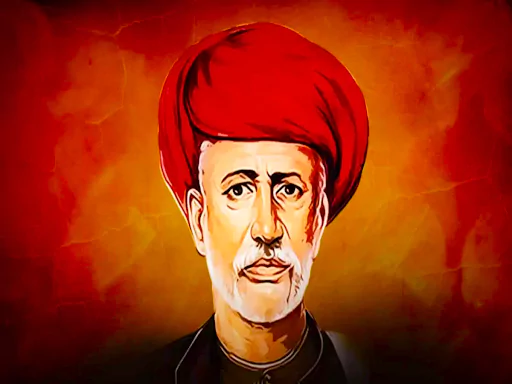Amidst the jubilant celebrations of Azadi ka Amrit Mahotsav, the legacy of Jyotirao Phule, a pioneer in social reform, resonates deeply.
| Relevance For Prelims: Jyotiba Phule Biography, Caste System, Social Empowerment, Social Inequality, Social Reform Movements, and Poverty And Development Issues.
Relevance For Mains: Phule’s view on caste system and Education |
|---|

Jyotirao Phule’s foresight extended to educational reforms, advocating for vocational training and multilingual education, ideas that resonate with modern policies like the New Education Policy, 2020. In today’s pursuit of an egalitarian society, Phule’s principles remain indispensable
| Mains Question: Discuss the values promoted by Jyotiba Phule and examine how these principles continue to resonate and influence contemporary society. (10 M, 150 Words) |
|---|
| Must Read | |
| NCERT Notes For UPSC | UPSC Daily Current Affairs |
| UPSC Blogs | UPSC Daily Editorials |
| Daily Current Affairs Quiz | Daily Main Answer Writing |
| UPSC Mains Previous Year Papers | UPSC Test Series 2024 |
Global leaders will gather in Canada’s capital -Ottawa – to discuss progress in drafting a first-ever global plastic treaty to rein in soaring plastic pollution by the end of the year.
| Relevance For Prelims: Climate Change, UN Climate Summit 2023 or COP28, 2015 Paris Agreement on Climate, Carbon Emissions, High Ambition Coalition for Nature and people, Thousands More Chemicals In Plastics Than Estimated, 2024 Plastic Overshoot Day Report, Challenge Of Plastic In The Himalayas.
Relevance For Mains: Plastic Pollution, Marine Pollution, Single use Plastics, |
|---|
While some advocate for stringent measures like production limits and phase-outs, others emphasize voluntary approaches and post-production interventions. Bridging these divides will be crucial to forging a comprehensive treaty that effectively addresses the lifecycle of plastics.
| Must Read | |
| NCERT Notes For UPSC | UPSC Daily Current Affairs |
| UPSC Blogs | UPSC Daily Editorials |
| Daily Current Affairs Quiz | Daily Main Answer Writing |
| UPSC Mains Previous Year Papers | UPSC Test Series 2024 |
Recently, petition against poll-time curbs raises legitimate questions about public participation.
| Relevance For Prelims: Election System In India, Section 144 of Code of Criminal Procedure court, Election Commission Of India, Model Code Of Conduct (MCC), One Nation One Election, and Rules For Star Campaigners In Election.
Relevance For Mains: Challenges associated with Election commission and Model code of conduct |
|---|
The case highlights the delicate balance between maintaining public order and ensuring democratic participation. Further examination is needed to determine the extent of discretionary powers during elections and their impact on civil liberties.
| Must Read | |
| NCERT Notes For UPSC | UPSC Daily Current Affairs |
| UPSC Blogs | UPSC Daily Editorials |
| Daily Current Affairs Quiz | Daily Main Answer Writing |
| UPSC Mains Previous Year Papers | UPSC Test Series 2024 |
India, like in many other countries, is undergoing a major “nutrition transition”.
| Relevance For Prelims: Health, India Spending Billions On Fast Food, Food Safety and Standards Authority of India, Article 21 of Constitution, National Commission for Protection of Child Rights, Eat Right India, the Fit India Movement, and Poshan 2.0 .
Relevance For Mains: Measures to curb Junk food consumption, Issues in dietary habits of youth |
|---|
Addressing the challenges posed by unhealthy dietary habits in India requires a multifaceted approach encompassing regulatory measures, consumer awareness campaigns, and policy interventions to promote access to and consumption of nutritious foods.
| Mains Question: Discuss the factors responsible for this Nutrition shift that India is currently undergoing, and how does it relate to the consumption of junk food? (15 M, 250 Words) |
|---|
| Must Read | |
| NCERT Notes For UPSC | UPSC Daily Current Affairs |
| UPSC Blogs | UPSC Daily Editorials |
| Daily Current Affairs Quiz | Daily Main Answer Writing |
| UPSC Mains Previous Year Papers | UPSC Test Series 2024 |
<div class="new-fform">
</div>
